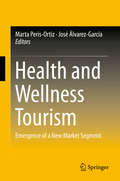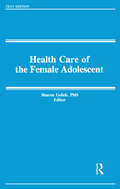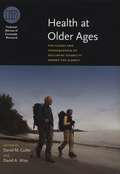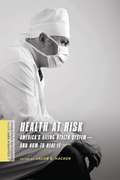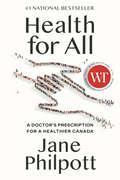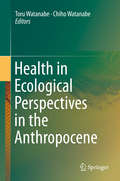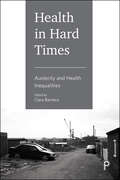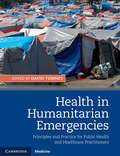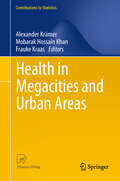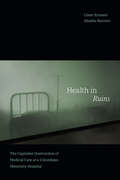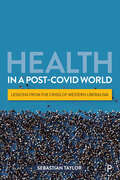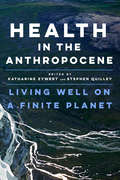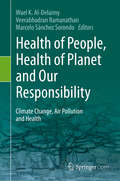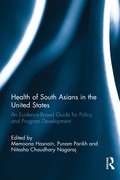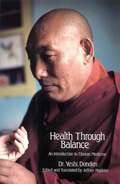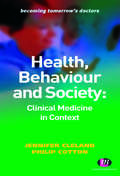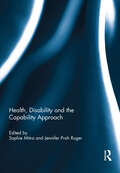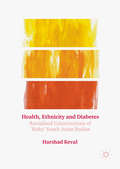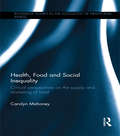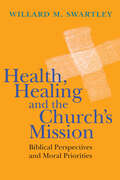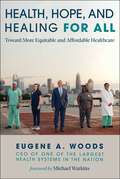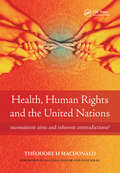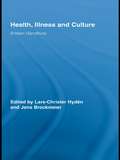- Table View
- List View
Health and Wellness Tourism
by Marta Peris-Ortiz José Álvarez-GarcíaThis book aims to contribute to the literature and aid in developing a theoretical and practical framework in the area of health and wellness tourism. With contributions and research from different countries using a practical approach, this book is an essential source for students, researchers and managers in the health and wellness tourism industry. Recently, there has been an increased interest in health and wellness due to greater life expectancy, aging populations, increasing levels of stress among others. In this context, the concepts of health, wellness, beauty, relaxation, and tourism can be combined to satisfy the needs of people seeking better quality-of-life. This has given rise to health and wellness tourism, a new market segment that contributes to employment and economic growth in the new economy. Health and wellness tourism involves two aspects: therapeutics, which seeks to cure certain diseases; and relaxation and leisure. As an alternative to traditional tourism, health and wellness tourism provides a new means of achieving regional and local development from a demographic, social, environmental and economic point-of-view. It contributes to tourist destinations' economic growth, acting as a pillar to support other complementary activities. In short, health and wellness tourism contributes to employment growth and regional wealth, contributes to tourism seasonality, promotes quality in tourism destinations, helps create new tourist services with high value, promotes establishment of international cooperation networks, and yields a number of additional benefits. Featuring a variety of programs and initiatives from different regions, with an emphasis on thermal and thalassotherapy establishments, this volume sheds light on this emerging market segment and its implications for economic and policy development.
Health and the Female Adolescent (Women And Health Ser. #Vol. 9, Nos. 2-3)
by Sharon GolubThis concise and fact-filled book is essential for anyone who cares for the well-being of adolescent girls. Knowledgeable professionals cover all the key current topics on female adolescent health, providing you with up-to-date and nonsexist information on the health problems adolescent females commonly encounter and ways in which to prevent or treat them.
Health at Gunpoint
by James J. GormleyWho controls the Food and Drug Administration (FDA), and what are the real goals of this powerful agency? These are the central questions explored in Health at Gunpoint, a book that brings intoclear focus the silent war being waged by the FDA against American consumers.The FDA was established in 1906 to protect the U.S. public from misbranded and adulterated foods and drugs. While the original intent may have been honorable, over the years, the mission has become tainted by lobbyists and money. In Health at Gunpoint, award-winning health writer James Gormley presents a history of this Federal agency&’s long-standing battle against health products and examines some of its most controversial decisions and the troubling reasons behind them.Now, the FDA is once again poised to make decisions that would have a major impact on the public&’s health—this time, by imposing restrictions that would eventually eliminate many of the nutritional supplements Americans take every day. Health at Gunpoint not only sheds light on what is happening, but also prepares you for the coming battle.
Health at Older Ages: The Causes and Consequences of Declining Disability Among the Elderly
by David M. Cutler David A. WiseAmericans are living longer and staying healthier longer than ever before. Despite the rapid disappearance of pensions and health care benefits for retirees, older people are healthier and better off than they were twenty years ago.
Health at Risk: America's Ailing Health System--and How to Heal It
by Jacob S. HackerIn this volume, the nation's leading advisors on health policy and financing appraise America's ailing healthcare system and suggest reasonable approaches to its rehabilitation. Each chapter confronts a major challenge to the country's health security, from runaway costs and uneven quality of care to declining levels of insurance coverage, medical bankruptcy, and the growing enthusiasm for health plans that put patients in charge of risk and cost. Bringing the latest research to bear on these issues, contributors diagnose the problems of our present system and offer treatments grounded in extensive experience. Free of bias and rhetoric, Health at Risk is an invaluable tool for those who are concerned with the current state of healthcare and are eager to effect change.
Health at Risk: America's Ailing Health System—and How to Heal It (A Columbia / SSRC Book (Privatization of Risk))
by Ed. Hacker Jacob S.In this volume, the nation's leading advisors on health policy and financing appraise America's ailing healthcare system and suggest reasonable approaches to its rehabilitation. Each chapter confronts a major challenge to the country's health security, from runaway costs and uneven quality of care to declining levels of insurance coverage, medical bankruptcy, and the growing enthusiasm for health plans that put patients in charge of risk and cost. Bringing the latest research to bear on these issues, contributors diagnose the problems of our present system and offer treatments grounded in extensive experience. Free of bias and rhetoric, Health at Risk is an invaluable tool for those who are concerned with the current state of healthcare and are eager to effect change.
Health for All: A Doctor's Prescription for a Healthier Canada
by Jane PhilpottFrom one of Canada's most respected and high-profile health professionals (and former federal Minister of Health), a timely, practical, ambitious, and deeply personal call for action on health that sets out the roadmap to our future well-being.Jane Philpott has spent her life learning what makes people sick and what keeps people well. She has witnessed miracles in modern medicine. She has also watched children die of starvation in a world that has plenty of food. With Health for All, she sounds a clarion call for a radical disruption in a health care system that is broken—but not beyond repair. The vision is rooted in a deep-seated commitment to health equity.Decades ago, a few visionary Canadian leaders put laws in place to ensure health care insurance for all. But the structures to deliver that care were never fully developed as envisioned. As a result, our health systems are not comprehensive or well-coordinated. In the wake of a pandemic, we risk it all falling apart. More than six million people have no family doctor, nor any other access to primary care. Emergency rooms are routinely closed. Exhausted health workers wonder if it will ever get better. Some say we should hand health care over to the private sector. But to abandon our commitment to publicly funded health care now would only lead to more expensive and less equitable care. Philpott outlines a different solution—an ambitious, once-in-a-generation reset of health systems with universal access to primary care teams.What sets this book apart is that it&’s more than a prescription for better medical care. Philpott looks at the big picture of health for all. This includes an intimate look at the personal roots of well-being: hope, belonging, meaning, and purpose. Then, through real-life stories, she examines the impact of the social determinants of health. Finally, she explains that none of this will happen without the political will to do the hard work of rebuilding a healthy society. The remedy we await is serious leadership to implement what we already know and to put the well-being of Canadians at the top of the agenda.
Health in Ecological Perspectives in the Anthropocene
by Toru Watanabe Chiho WatanabeThis book focuses on the emerging health issues due to climate change, particularly emphasizing the situation in developing countries. Thanks to recent development in the areas of remote sensing, GIS technology, and downscale modeling of climate, it has now become possible to depict and predict the relationship between environmental factors and health-related event data with a meaningful spatial and temporal scale. The chapters address new aspects of environment-health relationship relevant to this smaller scale analyses, including how considering people’s mobility changes the exposure profile to certain environmental factors, how considering behavioral characteristics is important in predicting diarrhea risks after urban flood, and how small-scale land use patterns will affect the risk of infection by certain parasites, and subtle topography of the land profile. Through the combination of reviews and case studies, the reader would be able to learn how the issues of health and climate/social changes can be addressed using available technology and datasets. The post-2015 UN agenda has just put forward, and tremendous efforts have been started to develop and establish appropriate indicators to achieve the SDG goals. This book will also serve as a useful guide for creating such an indicator associated with health and planning, in line with the Ecohealth concept, the major tone of this book. With the increasing and pressing needs for adaptation to climate change, as well as societal change, this would be a very timely publication in this trans-disciplinary field.
Health in Hard Times: Austerity and Health Inequalities
by Clare BambraAvailable Open Access under CC-BY-NC licence. How has austerity impacted on health and wellbeing in the UK? Health in Hard Times explores its repercussions for social inequalities in health. The result of five years of research, the book draws on a case study of Stockton-on-Tees in the north-east of England, home to some of the starkest health divides. By placing individual and local experiences in the context of national budget cuts and welfare reforms, it provides a holistic perspective on countrywide inequalities. Edited by a leading expert, this is an important book for anyone seeking to understand one of today’s most significant determinants of health.
Health in Humanitarian Emergencies: Principles And Practice For Public Health And Healthcare Practitioners
by David A. Townes Mike Anderson Mike GerberThe fields of Global Health and Global Emergency Response have attracted increased interest and study. There has been tremendous growth in the educational opportunities around humanitarian emergencies; however, educational resources have not yet followed the same growth. <P><P>This book corrects this trend, offering a comprehensive single resource dedicated to health in humanitarian emergencies. Providing an introduction to the public health principles of response to humanitarian emergencies, the text also emphasizes the need to coordinate the public health and emergency clinical response within the architecture of the greater response effort. With contributing authors among some of the world's leading health experts and policy influencers in the field, the content is based on best practices, peer reviewed evidence, and expert consensus. The text acts as a resource for clinical and public health practitioners, graduate-level students, and individuals working in response to humanitarian emergencies for government agencies, international agencies, and NGOs.<P> A valuable resource for both students and practitioners studying and working in humanitarian emergencies.<P> Presents contributions from the world's leading experts, written by those who have both practical, on the ground field experience, as well as research and policy experience.<P> Bridges the public health and healthcare response to humanitarian emergencies, facilitating a better understanding between the public health and healthcare response to these crises.
Health in Megacities and Urban Areas
by Alexander Krämer Mobarak Hossain Khan Frauke KraasDiverse driving forces, processes and actors are responsible for different trends in the development of megacities and large urban areas. Under the dynamics of global change, megacities are themselves changing: On the one hand they are prone to increasing socio-economic vulnerability due to pronounced poverty, socio-spatial and political fragmentation, sometimes with extreme forms of segregation, disparities and conflicts. On the other hand megacities offer positive potential for global transformation, e.g. minimisation of space consumption, highly effective use of resources, efficient disaster prevention and health care options - if good strategies were developed. At present in many megacities and urban areas of the developing world and the emerging economies the quality of life is eroding. Most of the megacities have grown to unprecedented size, and the pace of urbanisation has far exceeded the growth of the necessary infrastructure and services. As a result, an increasing number of urban dwellers are left without access to basic amenities like clean drinking water, fresh air and safe food. Additionally, social inequalities lead to subsequent and significant intra-urban health inequalities and unbalanced disease burdens that can trigger conflict and violence between subpopulations. The guiding idea of our book lies in a multi- and interdisciplinary approach to the complex topic of megacities and urban health that can only be adequately understood when different disciplines share their knowledge and methodological tools to work together. We hope that the book will allow readers to deepen their understanding of the complex dynamics of urban and megacity populations through the lens of public health, geographical and other research perspectives.
Health in Ruins: The Capitalist Destruction of Medical Care at a Colombian Maternity Hospital (Experimental Futures)
by César Ernesto Abadía-BarreroIn Health in Ruins César Ernesto Abadía-Barrero chronicles the story of El Materno—Colombia’s oldest maternity and neonatal health center and teaching hospital—over several decades as it faced constant threats of government shutdown. Using team-based and collaborative ethnography to analyze the social life of neoliberal health policy, Abadía-Barrero details the everyday dynamics around teaching, learning, and working in health care before, during, and after privatization. He argues that health care privatization is not only about defunding public hospitals; it also ruins rich traditions of medical care by denying or destroying ways of practicing medicine that challenge Western medicine. Despite radical cuts in funding and a corrupt and malfunctioning privatized system, El Materno’s professors, staff, and students continued to find ways to provide innovative, high-quality, and noncommodified health care. By tracking the violences, conflicts, hopes, and uncertainties that characterized the struggles to keep El Materno open, Abadía-Barrero demonstrates that any study of medical care needs to be embedded in larger political histories.
Health in a Post-COVID World: Lessons from the Crisis of Western Liberalism
by Sebastian TaylorWhat part do the values of growth and prosperity, freedom and justice, security and democracy play in social policy and human welfare? How can we judge the validity of these – the founding principles of Western liberalism – and the policies they shape, as the recipe for progress? At a time of global ‘permacrisis’, Sebastian Taylor applies his extensive frontline experience working with health systems and healthcare in the Global North and South to assess the concrete impact of contemporary liberal values on our welfare, development and environmental survival. Drawing on research from around the world, he uses health as an objective metric to assess how effective these policies are for individuals and society as a whole.
Health in the Anthropocene: Living Well on a Finite Planet (G - Reference,information And Interdisciplinary Subjects Ser.)
by Stephen Quilley Katharine ZywertAdding to a growing body of knowledge about how the social-ecological dynamics of the Anthropocene affect human health, this collection presents strategies that both address core challenges, including climate change, stagnating economic growth, and rising socio-political instability, and offers novel frameworks for living well on a finite planet. Rather than directing readers to more sustainable ways to structure health systems, Health in the Anthropocene navigates the transition toward social-ecological systems that can support long-term human and environmental health, which requires broad shifts in thought and action, not only in formal health-related fields, but in our economic models, agriculture and food systems, ontologies, and ethics. Arguing that population health will largely be decided at the intersection of experimental social innovations and appropriate technologies, this volume calls readers to turn their attention toward social movements, practices, and ways of living that build resilience for an era of systemic change. Drawing on diverse disciplines and methodologies from fields including anthropology, ecological economics, sociology, and public health, Health in the Anthropocene maps out alternative pathways that have the potential to sustain human wellbeing and ecological integrity over the long term.
Health of People, Health of Planet and Our Responsibility: Climate Change, Air Pollution and Health
by Marcelo Sánchez Sorondo Wael K. Al-Delaimy Veerabhadran RamanathanThis open access book not only describes the challenges of climate disruption, but also presents solutions. The challenges described include air pollution, climate change, extreme weather, and related health impacts that range from heat stress, vector-borne diseases, food and water insecurity and chronic diseases to malnutrition and mental well-being.The influence of humans on climate change has been established through extensive published evidence and reports. However, the connections between climate change, the health of the planet and the impact on human health have not received the same level of attention. Therefore, the global focus on the public health impacts of climate change is a relatively recent area of interest. This focus is timely since scientists have concluded that changes in climate have led to new weather extremes such as floods, storms, heat waves, droughts and fires, in turn leading to more than 600,000 deaths and the displacement of nearly 4 billion people in the last 20 years. Previous work on the health impacts of climate change was limited mostly to epidemiologic approaches and outcomes and focused less on multidisciplinary, multi-faceted collaborations between physical scientists, public health researchers and policy makers. Further, there was little attention paid to faith-based and ethical approaches to the problem. The solutions and actions we explore in this book engage diverse sectors of civil society, faith leadership, and political leadership, all oriented by ethics, advocacy, and policy with a special focus on poor and vulnerable populations. The book highlights areas we think will resonate broadly with the public, faith leaders, researchers and students across disciplines including the humanities, and policy makers.
Health of South Asians in the United States: An Evidence-Based Guide for Policy and Program Development
by Memoona Hasnain Punam Parikh Nitasha Chaudhary NagarajLeading scholars and practitioners come together in this contributed volume to present the most current evidence on cutting edge health issues for South Asian Americans, the fastest growing Asian American population. The book spans a variety of health topics while examining disparities and special health needs for this population. Subjects discussed include: cancer, obesity, HIV/AIDS, women's health, LGBTQ health and mental health. Health of South Asians in the United States presents research-based recommendations to help determine priorities for prevention, diagnosis, treatment, education, and policies which will optimize the health and well-being of South Asian American communities in the United States. Although aimed at both students, healthcare professionals and policy makers, this book will prove to be useful to anyone interested in the health and well-being of the South Asian communities in the United States.
Health through Balance: An Introduction to Tibetan Medicine
by Dr. Yeshi DhondenTibetan medicine holistically restores and maintains balance of the body's various systems through a variety of treatments, including diet, behavior modification, and the use of medicine and accessory therapy. Tibetan medicine is delicately responsive to patients' complete symptom patterns—no complaint being disregarded. Its wide variety of curative techniques are clearly explained. Dr. Donden's book was seen on NBC's Dateline during a feature on Tibetan medicine and breast cancer.
Health, Behaviour and Society: Clinical Medicine In Context (Becoming Tomorrow′s Doctors Series)
by Jennifer Cleland Philip Cotton Jennifer Cleland, Philip CottonThere is more to a person than a particular symptom or disease: patients are individuals but they are not isolated, they are part of a family, a community, an environment, and all these factors can affect in many different ways how they manage health and illness. This book provides an introduction to population, sociological and psychological influences on health and delivery of healthcare in the UK and will equip today’s medical students with the knowledge required to be properly prepared for clinical practice in accordance with the outcomes of Tomorrow’s Doctors.
Health, Disability and the Capability Approach
by Sophie Mitra and Jennifer Prah RugerThis book focuses on two areas of substantial and growing importance to the human development and capability approach: health and disability. The research on disability, health and the capability approach has been diverse in the topics it covers, and the conceptual frameworks and methodologies it uses, beginning over a decade and a half ago in health and more than a decade ago in disability. This book shares a set of contributions in these two areas: the first set of chapters focusing on disability; and the second set focusing on health and the health capability paradigm (HCP), in particular. This book was originally published as a special issue of the Journal of Human Development and Capabilities.
Health, Ethnicity and Diabetes
by Harshad KevalThis book explores the often contentious relationship between health, concepts of race and ethnicity, and the impact on South Asian groups. Using medical sociological and anthropological perspectives, it excavates racialised constructions of diabetes 'risk' within discourses, and highlights the contrasting counter narratives in people's accounts of their everyday lives. By identifying a number of components to the discursive, racialised construction of 'risky' South Asian bodies, this book problematises taken for granted understandings of culture, lifestyle and genetic risk. The mobilisation of these mechanisms in health science and interventions result in a racialising gaze, directed at groups already experiencing historically embedded race-related issues. The book situates these constructions of risk against the emergent, fluid and dynamic counter narratives to risk constructions. The new found momentum in genetic science is also critiqued in its formulation of racial-genetic risk, especially in the case of diabetes in South Asian groups, and is identified as perpetuating a series of racializing processes.
Health, Food and Social Inequality: Critical Perspectives on the Supply and Marketing of Food
by Carolyn MahoneyHealth, Food and Social Inequality investigates how vast amounts of consumer data are used by the food industry to enable the social ranking of products, food outlets and consumers themselves, and how this influences food consumption patterns. This book supplies a fresh social scientific perspective on the health consequences of poor diet. Shifting the focus from individual behaviour to the food supply and the way it is developed and marketed, it discusses what is known about the shaping of food behaviours by both social theory and psychology. Exploring how knowledge of social identities and health beliefs and behaviours are used by the food industry, Health, Food and Social Inequality outlines, for example, how commercial marketing firms supply food companies with information on where to locate snack and fast foods whilst also advising governments on where to site health services for those consuming such foods disproportionately. Giving a sociological underpinning to Nudge theory while simultaneously critiquing it in the context of diet and health, this book explores how social class is an often overlooked factor mediating both individual dietary practice and food marketing strategies. This innovative volume provides a detailed critique of marketing and food industry practices and places class at the centre of diet and health. It is suitable for scholars in the social sciences, public health and marketing.
Health, Healing and the Church's Mission: Biblical Perspectives and Moral Priorities
by Willard M. SwartleyDoes the Christian community have the resources to develop a coherent response to health care challenges today? Accounting for biblical, theological and church-historical streams, Willard Swartley divulges a long tradition of healing and health care inherited by Christians today. Beginning with in-depth studies of Old and New Testament understandings of healing, the book surveys three millennia of biblical and theological teaching and practice in congregational life and mission. Along the way Swartley uncovers how Christians have understood the role of the church and other institutions in providing health and healing. The book concludes with an attempt to synthesize these biblical, historical and moral perspectives to help all Christians, including those in health care professions, respond to our current health care challenges.
Health, Hope, and Healing for All: Toward More Equitable and Affordable Healthcare
by Eugene A. WoodsOne of America&’s top healthcare leaders offers a prescription to fix an ailing and inequitable healthcare system In Health, Hope, and Healing for All, Eugene A. Woods, CEO of Advocate Health, one of the largest non-profit health systems in the nation, provides a riveting behind-the-scenes look at healthcare in the United States. By sharing his insights from three decades in healthcare administration, as well as his personal journey, readers gain a deeper understanding of the challenges facing healthcare systems and the impact on all of us. Woods sheds light on the inequities our communities face, especially in the context of the COVID-19 pandemic, and presents actionable prescriptions to create a more equitable, just and accessible healthcare system. He tackles tough questions around the affordability of healthcare, rising drug prices, alarming clinical shortages and more. As a Black healthcare CEO, Woods shares his personal experiences with injustice and charts a path towards meaningful change. His optimistic outlook and passion for transformation and innovation inspire readers to believe in the power of unity and resilience in the face of adversity.Health, Hope, and Healing for All is a must-read for those working in healthcare, policymakers, and individuals seeking hope and answers in an uncertain healthcare landscape. Supported by Woods' expertise and credibility, the book presents real solutions to the current crisis and highlights the urgent need to ensure accessible, affordable and compassionate healthcare for every American.
Health, Human Rights and the United Nations: Inconsistent Aims and Inherent Contradictions?
by Theodore Macdonald Diane Plamping'In the light of impending environmental catastrophe, people all over the world, in all walks of life, are becoming more aware of the pressing need to act globally. The need to base our decisions and actions less on parochial national advantage, sequestered in hate and suspicion of other nation's playing the same game of Russian roulette, have to give way to a new appreciation of the fact that our global village is indeed so very small and perilously frail. We depend upon one another as never before and, unless we insure the health and human rights of all, we shall surely each perish individually...' In "Health, Human Rights and the United Nations", Theodore H MacDonald carefully analyses the origin, development and structure of the United Nations (UN) and its key agencies, and considers its capacity to mediate the Universal Declaration of Human Rights. He takes a detailed look into human rights abuses in Sudan's Darfur province, Burma, Liberia, the Occupied Palestinian Territories and the United Kingdom. By investigating the development of the World Health Organization (WHO) and the pressures being brought to bear upon it, MacDonald exposes contradictions in the aims of both the WHO and the UN. Does the current global political scene and its neoliberal policies nullify the work of both? Is the UN fit for purpose? Can drastic reforms result in equitable solutions? Can a new trans-national body be developed, to arbitrate global trade, health, human rights and fiscal issues? This remarkable book is ideal for anyone interested in international law, human rights, global health, public health and health promotion. Public health and health promotion professionals, including international healthcare organisations, care agencies, and international charities will find the analysis enlightening. It is also of great interest to policy makers and shapers in communities and government, political activists and all those with an interest in equality and globalisation.
Health, Illness and Culture: Broken Narratives (Routledge Studies in Health and Social Welfare)
by Lars-Christer Hydén Jens BrockmeierThis collection of essays examines the interrelations between illness, disability, health, society, and culture. The contributors examine how "narratives" have emerged and been utilized within these areas to help those who have experienced d injury, disability, dementia, pain, grief, or psychological trauma to express their stories. Encompassing clinical case studies, ethnographic field studies and autobiographical case studies, Health, Illness and Culture offers a broad overview and critical analysis of the present state of "illness narratives" within the fields of health and social welfare.
